
5 minute read
TACKLING PLASTIC POLLUTION
TACKLING PLASTIC POLLUTION
FEATURE REBECCA KIERMAN PHOTOGRAPHY ALLY LANDES
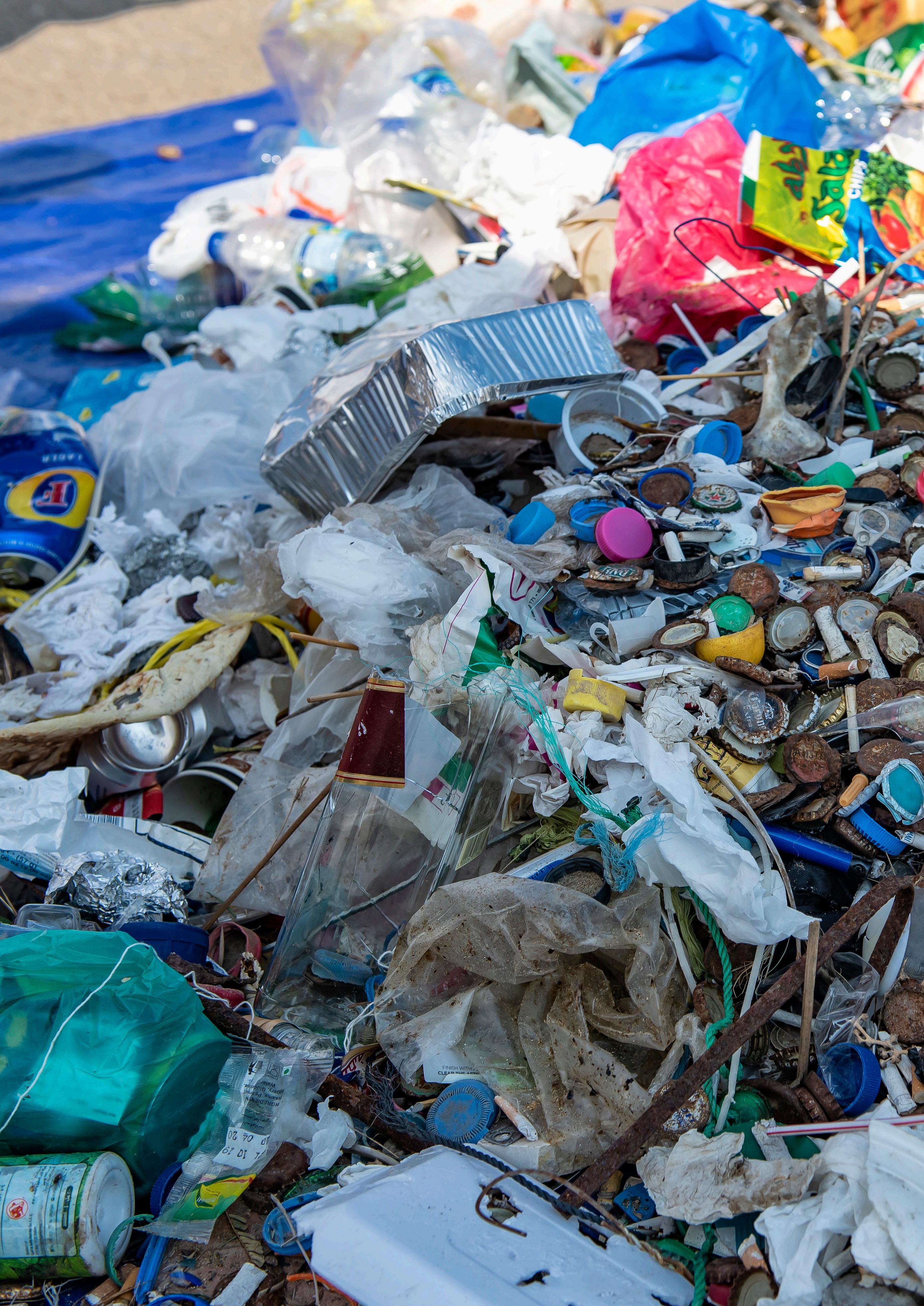

“If it can’t be reduced, reused, repaired, rebuilt, refurbished, refinished, resold, recycled or composted, then its should be restricted, redesigned or removed from production” – Pete Seeger.
As Cleanup Arabia events are finalised across the UAE, it seems a fitting time to reason the benefit accompanied. If you were an EDA Member who contributed towards this successful nation-wide movement, keep reading to gain a greater understanding of how much you helped and how you can further support worldwide plastic pollution.
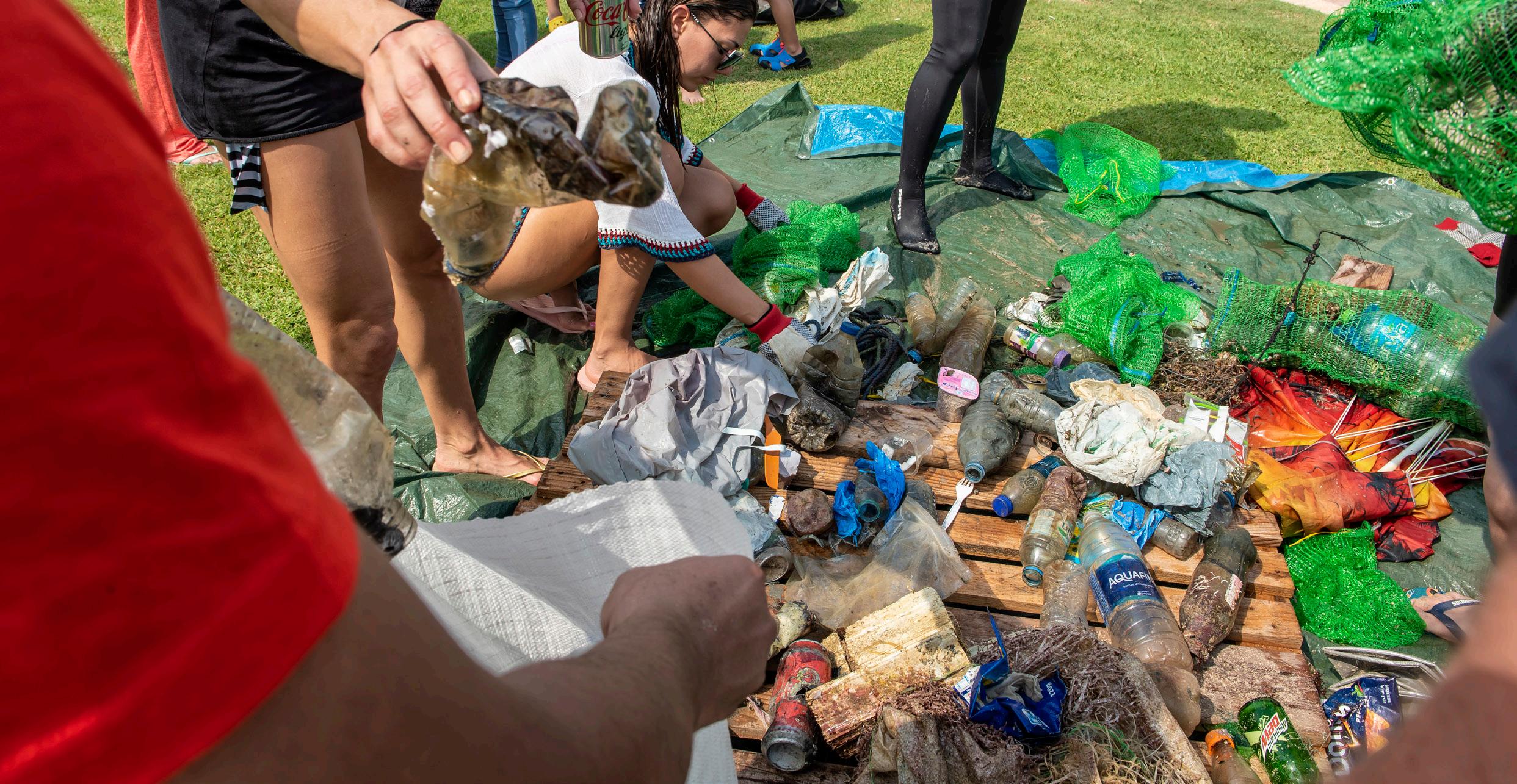
Counting individual items from a dive clean-up.
Following a beach clean with a large company, when a team member was asked why he was participating in this event – he told us that it was important to look after the planet as though it was your own back garden. This statement should echo true with all citizens, yet some are affected by plastic pollution more severely than others. For some people, plastics are out of sight and out of mind. So if you don’t care too much for sea creatures, be it consuming them or looking at them (I prefer the latter) – why should we clean-up debris from coastal and marine habitats?

First rubbish collection by 120 volunteers on Sandy Beach’s public beach on the 22nd of November.
Plastic pollution has become insurmountable so unfortunately beach and ocean cleans are no longer the ‘solution’ to marine debris. However they are an effective educational tool. The solution is to identify where waste prevention is required. This is a simple task, consider simple alternatives such as using reusable water bottles, reusable coffee cups or metal straws. As consumers, we are the ones with the power to control the market, making informed choices is an effective driver for retailers. Drivers belong to society, the producers require us in order to make money.
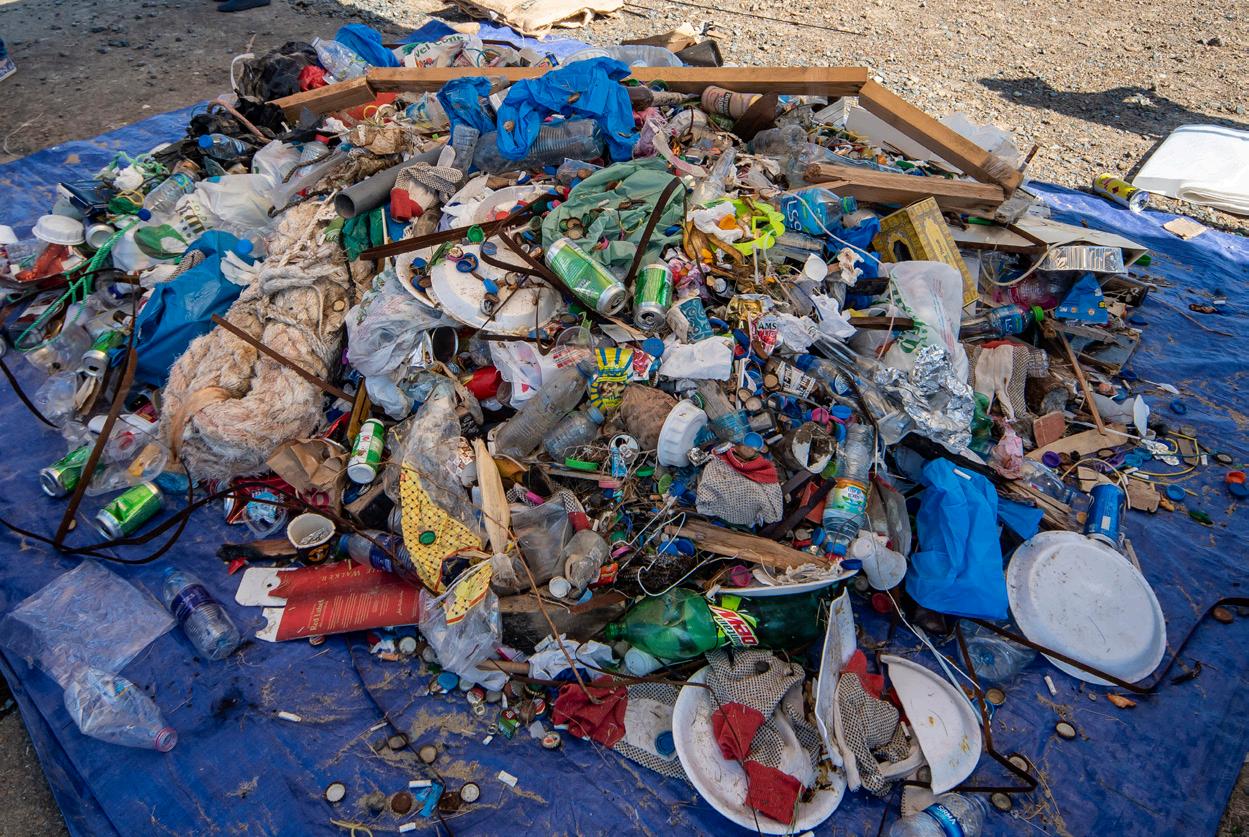
First rubbish collection by 120 volunteers on Sandy Beach’s public beach on the 22nd of November.
Linear consumption has been the cause of plastic pollution, we have become acquainted to single-use plastics which have infested oceans. It was recently predicted that on average a single plastic bag is used for 12 minutes only. In addition 95% of plastic packaging is only used once, which highlights the requirement for reuse.
“If it can’t be reduced, reused, repaired, rebuilt, refurbished, refinished, resold, recycled or composted, then its should be restricted, redesigned or removed from production” – Pete Seeger.
One of the many benefits of plastics is its weight and durability, allowing it to flourish for many years. Plastics ability to defeat natural decay can be of grace to its primary chemical – fossil fuels, which are a contributing factor to global warming. Despite the depleting availability of fossil fuels, plastics are often cheaper to produce than to be recycled.

All the items collected underwater.
Unfortunately the groups affected are separated in space and time. Many third world countries lie a victim of plastic pollution, as a result of poor waste management and lack of awareness. But for many it lies outside of their circle of interest, with impending poverty. Thus potentially one of the reasons that plastics thrive are its low monetary worth. It’s not often you come across gold or metals lacing the E311. As such, if plastic waste was given a net worth, maybe more people would be interested in beach cleans. This could also elevate poverty.
Some companies have sought to give plastics a net worth, through engineering intuition. A particular company that inspired me was ‘Race for Water’, a Swiss company who has chosen to tackle plastics from all corners of the playing field. This company is harnessing three types (hydrogen, wind and solar) of sustainable energy whilst circumnavigating the world on a 5 year expedition. Most interestingly, a new technology, ‘Biogreen’, allows the boat to collect plastics from the ocean as they sail, meanwhile the collected debris is superheated in absence of oxygen, which can be transferred into energy. This technology is revolutionary, but they don’t stop there, during their travels they stop at countries to spread to word of plastic pollution, thus raising awareness.
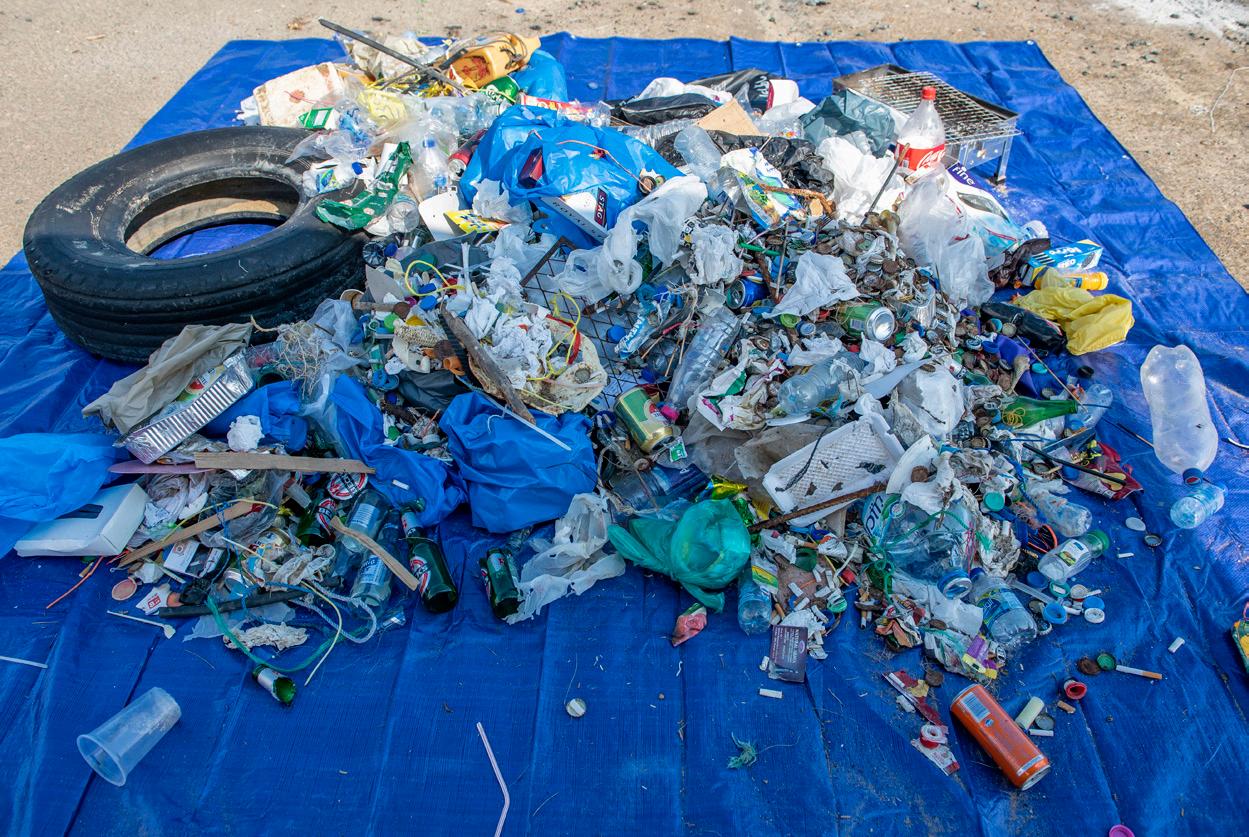
Second rubbish collection by 9 volunteers on Sandy Beach’s public beach on the 24 th of November before being counted.
When considering which plastic items to boycott, it is essential to be informed of the top 5 marine debris items, inclusive of micro-plastic fragments, plastic bottles, plastic wrappers and fishing line –Project Aware. Ocean clean results can vary, plastic bottles are the number one item found, due to PET’s lower density than sea water, allowing it to sink. However the vast majority of plastics have been broken down via UV rays into micro-plastics, which can make re-collection very difficult.
Often micro-plastics are out of sight, but this isn’t just a result of their size. Plastic is often concentrated in gyres – large circular currents in the oceans. Consequently plastic gets caught up in this vortex and doesn’t escape. Many have heard of the ‘plastic island’ in the East pacific, which is the ‘size ofTexas’. When Charles Moore, made this statement, I think many imaginations envisioned a little island, but in actuality 94% of this area is composed of micro-plastics. Furthermore a large majority of debris is associated with fishing. Ghost nets/ discarded fishing gear is often accompanied by the deaths of many marine animals.
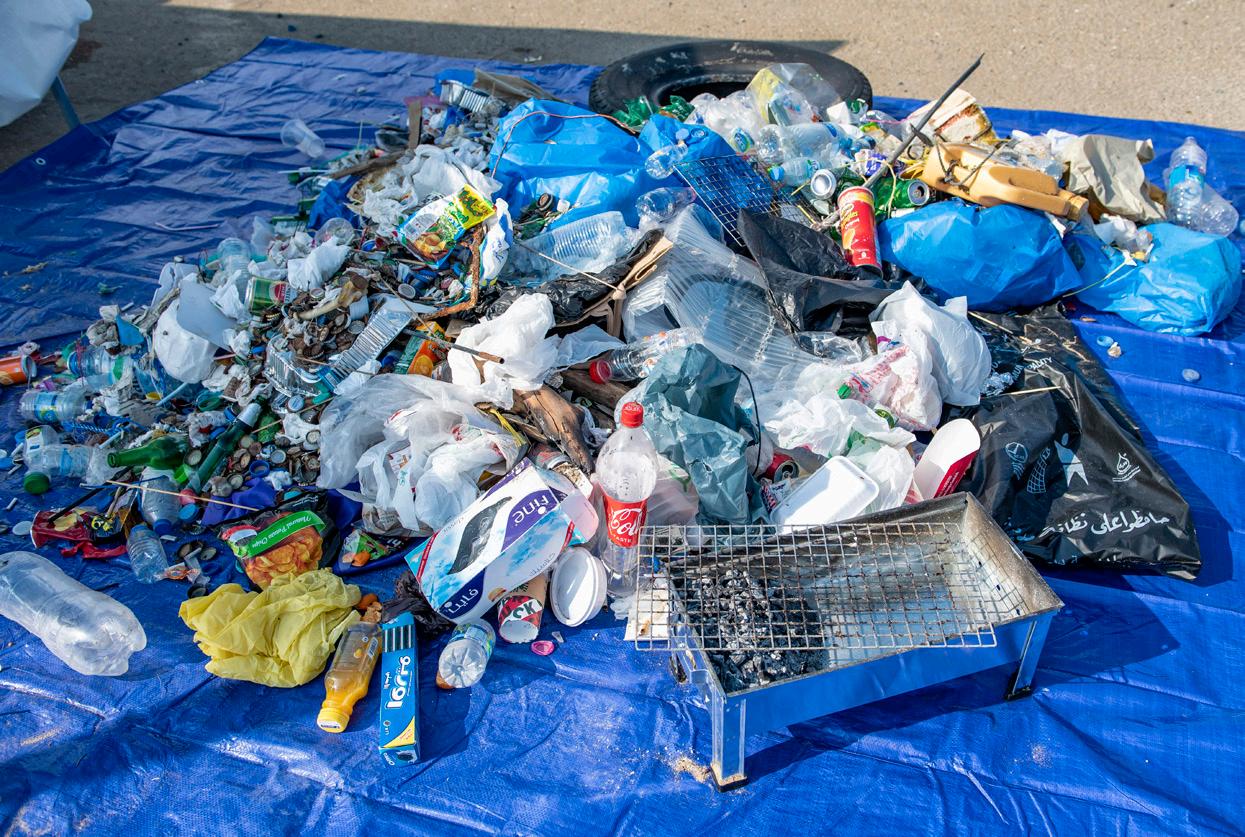
Second rubbish collection by 9 volunteers on Sandy Beach’s public beach on the 24 th of November before being counted.
It’s estimated that 8 million tonnes of plastic enters the ocean each year, 80% of this plastic is from land-based sources. Although new technologies such as above sea surface cleaners are valuably contributing towards a cure, land based prevention is of paramount importance. Beach and ocean cleans themselves can be likened to the importance of CSR events – whom have been the greatest contributors when analysing the latest Cleanup Arabia. CSR is a crucial component of any company and has allowed enterprises to elevate their impact on society. Meanwhile members of the public are becoming more aware about anthropogenic effects on the environment. Events like these could be your opportunity to ‘give back’ on an individual level.
At Freestyle Divers we pledge to organise regular ocean cleans, so if you’re interested in participating in a nationwide clean-up – get in touch via: info@freestyledivers.me










